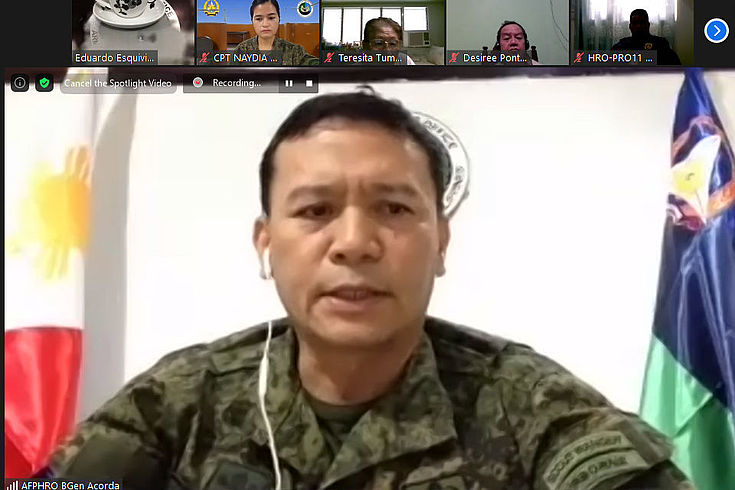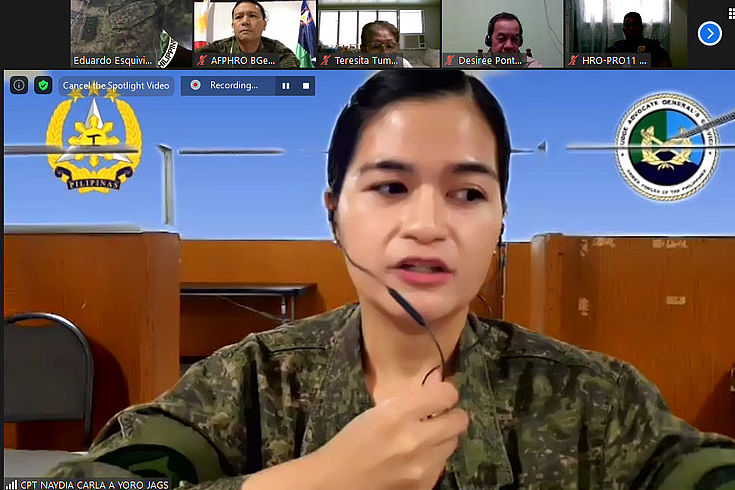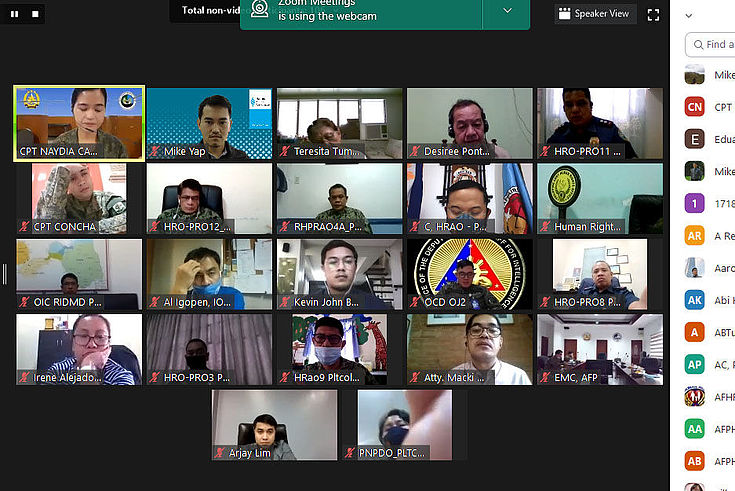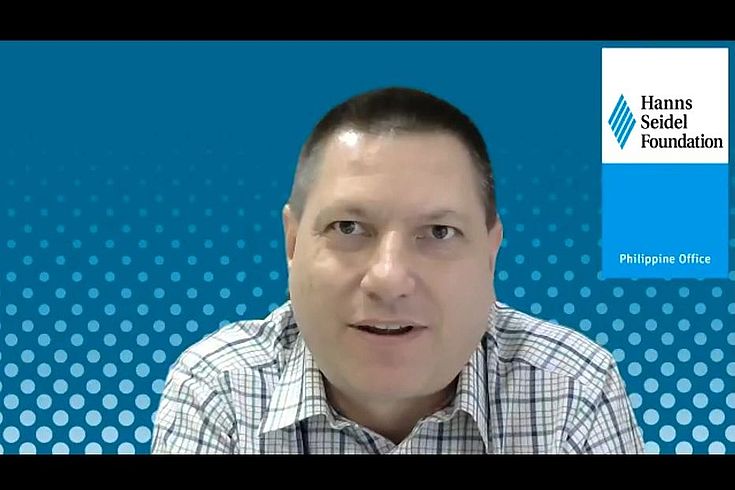On Community-based Dialogues
CBD on the Anti-Terrorism Law of 2020 held online

Brig. Gen. Raymundo Acorda delivers his opening remarks
HSF
The virtual community-based dialogue (CBD) was well received and participated in by one hundred twenty-nine (129) individuals representing relevant institutions and groups from different sectors of society, i.e., national, regional and local government agencies; civil society organizations/non-government organizations; security sector; the academe, and the Commission on Human Rights. The participants covered all regions of the country. The German Ambassador, Her Excellency Anke Reiffenstuel, also graced the event.
The Chief of the AFP HRO, Brig. Gen. Raymundo Acorda gave the Opening Remarks underlining the importance of the activity in providing a venue for key stakeholders to better understand and appreciate the Anti-Terrorism Law (ATL) given the high level of interest generated from various sectors. He acknowledged the broad participation of these sectors in the online CBD.
AFP HRO Acting Assistant Chief, Lt. Col. (Atty.) Eduardo Esquivias, who served as facilitator, warmly welcomed the participants and emphasized the value of holding this multi-sectoral dialogue as a mechanism for an open and constructive presentation and discussion on the key features of the law, its implementation processes as well as its effects to Philippine society in pursuit of peace, progress and development, and respect of basic human rights.

Captain Naydia Carla Yoro JAGS gives a briefing on the newly-signed “Anti-Terrorism Law of 2020”
HSF
The main speaker/resource person, Captain Naydia Carla Yoro JAGS of the Office of the Judge Advocate General of the AFP gave a complete but succinct briefing on the newly-signed “Anti-Terrorism Law of 2020”. The participants expressed their gratitude and appreciation for the presentation, and requested that a copy be shared with them.
A panel of reactors comprising of 10 key representatives from CSOs/NGOs, CHR, government agencies, and the academe shared their views and concerns on the provisions of the law relative to its effects on their work/mandate, advocacies, and engagements with various sectors. The reactors were: (1) Prof. Rommel Banlaoi (Department of International Studies, College of Arts and Sciences, Miriam College), (2) Mr. Senen Bacani (Chairman Emeritus of the National Cooperative Movement), (3) Atty. Mario Maderazo (Senior Lawyer, Initiatives for Dialogue and Empowerment through Alternative Legal Services), (4) Atty. Gian Miko Arabejo (Program Officer, Alternative Law Groups), (5) Ms. Rosemarie Trajano (Secretary-General, Philippine Alliance of Human Rights Advocates; Convenor, IDefend), (6) Commissioner Karen Gomez-Dumpit (CHR CBD Project Commissioner-in-Charge), (7) Assistant Secretary Alexander Macario (Department of the Interior and Local Government/DILG), (8) Atty. Arjay Lim (Legislative Liaison Specialist, Department of National Defense/DND), (9) Atty. Elias Omar Sana (Technical Consultant, Department of Information and Communications Technology), and (10) Atty. Jonathan Pabillore (Office of the Solicitor General/OSG).

The online activity was well received and participated in by one hundred twenty-nine (129) individuals
HSF
Highlights of the points raised by the reactors are as follows:
- The ATL is a legal measure against terrorism to put to justice those committing acts of terrorism.
- It is not intended to eradicate terrorism; nonetheless, it is a better law that can fight terrorism as it promotes good governance, empowerment, and capability-building of those in the frontlines.
- In countering violent terrorism, a comprehensive approach should be pursued addressing economic, social, political, cultural, and personal needs.
- Push for a community-based approach in implementing plans and programs to strengthen the country’s capability in counter-terrorism, particularly those of law enforcement agencies.
- Do not overlook the issue of gender sensitivity as the gender perspective matters in counter-terrorism (women are active suicide bombers as well).
- There should be stronger cooperation with other countries in countering violent extremism.
- There is a need to engage CSOs and local governments in crafting the law’s implementing rules and regulations (IRR).
- Several petitions have been filed with the Supreme Court (SC) for a temporary restraining order (TRO) or junking of the law itself. Hoping that the SC will decide in a timely manner as the law will take effect soon and crafting of the IRR is underway.
- The Anti-Terrorism Council (ATC) should conduct broad/participatory consultations with various sectors and at the community level to get the real pulse and sentiments of the people on the ground.
- The CHR should be part of the ATC, at least as observer, especially during the conduct of public hearings for the crating of the IRR.
- Several provisions of the law need closer study such as Sections 2, 4a, 9 & 29 towards having clearer parameters in the implementation of the law.
- Looking forward, there is a need for capability-building/training of relevant authorities/ stakeholders in the fight against terrorism in the future.
- Upholding the “presumption of innocence,” among other human rights standards is critical and should be the direction of the government.
- Under the law, presumption of innocence still exists.
- Providing greater awareness and understanding on counter-terrorism is deemed more beneficial/constructive than focusing on punishment.
- The government should strengthen its monitoring of and provide closer guidance to law enforcement agencies to protect the basic rights of its citizens.
- The ATL promotes a culture of impunity in the country with some law enforcers and military personnel being involved in human rights violations.
- The longer detention period is prone to torture and abuse.
- Some human rights organizations are being tagged as supporting the “left.”
- The government should give more attention to addressing issues related to economic, social and cultural rights (ESCR) such as the distribution of lands to agrarian reform beneficiaries and ensuring that CLOA (Certificate of Land Ownership Awards)-holders are installed on their lands without delay. It should also support the development needs of indigenous peoples and marginalized communities.
- It is common knowledge that there are “bad eggs”/scalawags in the PNP and AFP who are undermining the trust and respect of the people towards them, thus, criminal cases should be filed promptly against those who abuse their mandate as protector of the people and the state. ALG is an ally in pursuit of human rights promotion and protection, and is willing to work with the security sector.
- PAHRA and IDefend’s objectives, and partnerships/engagements with various sectors of society, including the government, are open and transparent. However, PAHRA’s experiences with some members of the security sector are frustrating having been a recipient of intimidation/vilification/threats over a period of time.
- The phrase “overprotection of suspects” is not a good term to describe one of the provisions of the law in the briefing material; long detention period is a violation of the Constitution and under the International Convention on Civil and Political Rights, it could be considered as cruel, degrading and inhumane treatment; and questions on the proportionality of punishment being imposed by the law.
- The ATL is a legal cover against terrorists and allows the government to be better equipped in performing its mandate to protect and secure the people from terrorists. The law is not a tool for abuse.
- There is a need to amend/repeal the Human Security Act of 2007 in consideration of the Zamboanga siege and Marawi siege, approval of new laws such as the International Humanitarian Law/IHL, and human rights laws (Anti-Torture, Anti-Enforced Disappearance, Human Rights Compensation), among others.
- CHR shall monitor the activities of the Anti-Terrorism Council.
- There is need to protect critical infrastructure in the country which are often targets of terroristic activities, whether physical or virtual assets. The more we move towards digitalization, it is important to secure these assets as it affects the ability of the people and the government to access the internet.
- The OSG supports the ATL to prevent overt activities perpetrated by terrorists and its resulting impact especially to highly vulnerable communities given the evolving technology, e.g., suicide bombers.
- Under the law, a joint Congressional Oversight Committee shall be formed to oversee the implementation of the law. (by presentor)
- Prior surveillance is not required before arrest.
- The Community-based Dialogue (CBD) is a good initiative, as it doubles as an information campaign especially for members of civil society.

Mr. Götz Heinicke delivers his closing remarks
HSF
The open forum gave the participants an opportunity to ask questions and seek clarifications.
Finally, Lt. Col. Esquivias thanked the HSF for the successful partnership through the CBD project and all the participants for participating in the online dialogue.
HSF Resident Representative, Mr. Götz Heinicke closed the highly successful online CBD, the first of its kind hosted by HSF. He thanked the participants for the open, friendly and honest exchange/interaction as well as to the AFP HRO led by Brig. Gen. R. Acorda and the Office of the Judge Advocate General of the AFP for the excellent briefing on the ATL, not to mention his colleagues at the HSF Philippine Office for bringing different sectors together for this online event. He committed HSF’s continued support for future online activities in cooperation with its partners.
